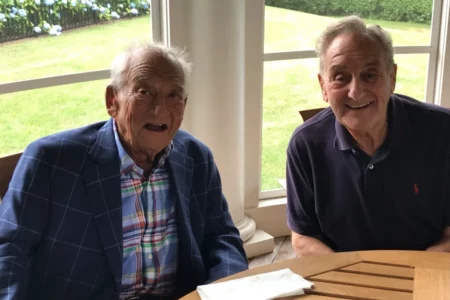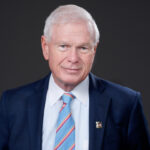Like most everybody who knew him, I learned a lot from Bob Popeo, the ultimate Boston lawyer who died last week at age 85.
One time I was slightly jammed up about something or other, and I explained the terrible unfairness of it all to Popeo.
“Bob,” I said, “I’m innocent.”
He chuckled.
“Howie,” he said, “you are not ‘innocent.’ Don’t ever forget that. Nobody is ‘innocent.’ The most you, or anybody else, can ever hope to be is ‘not guilty.’”
It was like a legal interpretation of what the nuns used to call “original sin.” Everybody’s dirty starting out, which is why you need… baptism. And once you get older, if you’re in business – monkey business, anyway — you need a great lawyer like Bob Popeo.
Everybody of a certain age and class in Boston understood this. In 2016, they were dedicating a room at the State House to Bob Crane, one of Popeo’s former clients, the former state treasurer who retired in 1990.
It was a big day for the old gang, and I do mean gang.
Popeo arrived a little late. After glancing around the room, he looked at me and whispered:
“All the rogues are here!”
He would have known. At least six or seven of his old clients were in attendance – not just me and Crane, but also Billy Bulger. And the then-House speaker Bob DeLeo, whose campaign committee paid Popeo’s law firm more than $400,000. Eventually the feds decided that DeLeo was a mere “unindicted co-conspirator” rather than the fourth speaker in a row to actually be indicted.
To stay out of prison, to keep the pension – Popeo was a bargain.
I got to know Bob Popeo when he was defending Vinnie Piro, my state rep from Somerville. Vinnie had been indicted on an attempted-extortion rap. He had taken a bribe from an undercover FBI agent, but later given the cash back – different serial numbers, but what the hell.
I was working for Channel 7, covering Vinnie’s trial every day. Somehow, I obtained a copy of the transcript of the meeting in which Vinnie returned the money. The federal prosecutor threatened me with dire consequences if I ran the story, but I laughed it off. It was the lead story on the early newscast.
The next day, in the courtroom, this snotty prosecutor from Weston haughtily asked me if I still lived in Somerville. I shrugged. We weren’t all born with a silver spoon in our mouths, you know.
A few days later, I received a letter at my Somerville address from the Internal Revenue Service. I had been selected for a “random” audit. I was still covering the trial, so the next morning I brought the letter to court with me and showed it to Popeo.
He laughed, pulled a letter out of his pocket, and handed it to me. It was the exact same letter I’d gotten from the IRS.
“Let me have your letter,” he said. “I’ll handle this, for both of us.”
A few days later, Popeo gave me a copy of the letter he’d written on my behalf to the IRS. When I read it, I was amazed.
The language he had used was so scorching it almost burned my hands. Popeo was demanding every document and communication that the IRS had in its possession relating to the “random” audit of Mr. Carr.
My accountant offered to provide the IRS with whatever they needed. They never responded, not even an official notice terminating the audit. Popeo had scared the bleep out of them. I was quite impressed.
A few years later, after Mike Dukakis was defeated for the presidency, I started getting hassled by the State Department of Revenue. I called Popeo. Again, he seemed amused.
“We’ve already got immunity for 10 years from the feds,” he said. “Once I write a letter, the state will leave both of us alone for 10 years too.”
Another thing Popeo taught me was the value of private detectives.
The cop the feds had used to get Vinnie Piro had been in the Detroit FBI office. Pretty soon Popeo had an arrest report on him. After a boozy cop hockey game, the G-man had been arrested for taking a leak by the side of the road on his way home.
Popeo even got the records of the fed’s FBI-issued credit card, showing that he’d been charging a lot of purchases at a local toy store – just before Christmas.
Popeo also educated me about polygraph tests. He had Vinnie Piro take a lie-detector test, to prove that he hadn’t understood that he was being bribed. Vinnie passed the test with flying colors.
What that taught me was why lie-detector tests were inadmissible as evidence at trial. Because if Vinnie Piro could pass one, what the hell could they possibly be worth?
Bob’s law firm, Mintz Levin, was and is very political. He represented Crane when he was in his photo finish with the grand jury. Soon Mintz was the treasurer’s bond counsel – a big windfall.
They hired pols and the relatives of pols – among them the brothers of John Kerry and Ed Markey. If someone wasn’t a lawyer, Popeo might put him on the payroll as a “lobbyist.”
A lot of these white-shoe firms traditionally prefer to deal with the Beautiful People. Popeo was from “the neighborhood,” as Chuck Berry used to say. Being from East Boston, he didn’t look down his nose at his former “neighbors” who didn’t go to wooden churches.
A few years back, then-Mayor Marty Walsh was… hearing the footsteps, you might say.
“I have done no wrong-doing,” he stammered. Beautiful. I knew what was coming next. I checked Marty’s campaign-finance reports and sure enough – he was paying a $10,000-a-month retainer to Mintz Levin, that is, Bob Popeo.
It was a good investment. Now Marty’s making $3.5 million a year running the NHL Players Association.
For so many of us, it was always comforting to have Bob Popeo’s phone number if, and when, we ever needed it.
Even if we were innocent, er not guilty.


